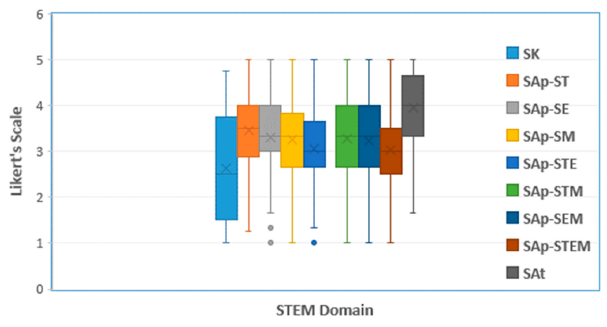Text based on Wahono, B., & Chang, C.Y. Sustainability 2019, 11(4), 950; https://doi.org/10.3390/su11040950
Attitudes, knowledge, and application (AKA) are three important domains for educational assessment. These three elements can provide comprehensive information, as well as an overview of what is happening in an educational system, including data related to STEM education. The assessment of the current status of the development of STEM education, through these three domains, is an effort towards fostering the progress of STEM education.
- Assessment
- STEM education
- Indonesia
- Education
- Science Teachers
- Attitude
- Knowledge
- Application
- AKA
We found an exciting finding of STEM education in Indonesia. A large number of respondents (more than 50% of respondents are below the total average of score) did not know much about or have never heard of the term STEM. Another interesting finding, from this study, was that, on average, almost 50% of respondents applied STEM lessons in their science classes. Another finding of the current research is that although most teachers do not know what STEM is, more than 75% of teachers have a very good attitude towards STEM. This condition is also potentially the reason why teachers have implemented STEM, without knowing the term.
 Figure 1. Descriptive data on each STEM Domain
Figure 1. Descriptive data on each STEM Domain
The low category level of knowledge and moderate level for the application of science teachers regarding STEM education indicate that a lot of things must be managed to improve the usefulness of STEM education in Indonesia. Furthermore, based on the model of a quality STEM program pathway [1], this current result of research indicated that Indonesia is still in the initiating position (from four positions: not yet ready, initiating, improving, and expanding). Perhaps, structured and massive professional development is one of the possible ways to improve this condition. Inevitably, however, STEM education that is powerful in shaping the younger generation for a career in the STEM field [2][3] has the potential to make development better in many fields. Moreover, the results of this research indicated that the teachers’ (more than 75% of respondents) have a positive attitude towards STEM. Teachers’ attitudes towards STEM activities were also investigated by another researcher, and the result showed that teachers have a positive attitude towards STEM [4]. Indeed, a positive attitude is an important factor in implementing STEM learning. These positive attitudes become a strong foundation as motivation to learn more, and at the same time, to apply STEM in each class.
Furthermore, from this current research, it was revealed that novel teachers had a better knowledge value of STEM (2.866) than veteran teachers (2.106). The novel or the young teachers, who still have extended teaching opportunities, are very supportive in the efforts to promote education. This condition certainly supports the development of a better educational system, economy, and welfare for future generations. Those developments for the future are highly determined by the condition of how the teachers teach the students in the classroom right now.
STEM as a learning approach is closely related to teachers and students. Regarding the purpose: to maintain the quality of teaching and learning, it is important to know about the assessment domains of attitude, knowledge, and application (AKA) in the field [5]. Assessment became a tool to realize the purpose. The main purpose of the assessment in education is to find out the extent of implementation, success, lack, and advantages of the application on education itself [6]. Indeed, an assessment must focus on sustainability. The sustainability of STEM assessment is closely related to improving relationships between teacher(s) and students in the classroom [2].
Further, the sustainability of assessment plays a vital role in improving the educational system, curriculum, quality of teaching, and student learning [7][8]. Assessment reveals the shortcomings, as well as the advantages, of education implementation, including STEM education. Development of a country will run smoothly if education supports the development. Some components in education, such as citizenship education, education for a culture of peace, gender equality, and respect for human rights, as well as health education, are needed to support the development of a country. Therefore, the authors can say that what is done in education will affect the sustainability of the development of a nation. The role of education is sustainable development [9]. The relationship between education and sustainable development revealed that the development of education in the context of sustainable development is not only the promotion of the answer to science but also different perspectives on every facet of our lives. Finally, this current research showed that assessment can contribute as a tool to foster the sustainable development of STEM education.
For citation purpose, please refer to https://www.mdpi.com/2071-1050/11/4/950
References
- CAN. Assessment and Planning Tool for STEM in Expanded Learning Programs; California AfterSchool Network:Oakland, CA, USA, 2018.
- Caprile, M.; Palmen, R.; Sanz, P.; Dente, G. Encouraging STEM Studies for the Labour Market; Directorate-General for Internal Policies, European Parliament: Brussels, Belgium, 2015.
- Charette, R.N; Commentary: STEM sense and nonsense. Educ. Lead. 2014, 72, 79-83, ..
- Vennix, J.; Brok, P.D.; Taconis, R.; Perceptions of STEM-based outreach learning activities in secondary education. Learn. Environ. Res. 2017, 20, 21-46, 10.1007/s10984-016-9217-6.
- Wahono, B.; Chang, C.Y.; Development and validation of a survey instrument (AKA) towards attitude, knowledge and application of STEM. J. Balt. Sci. Educ. 2019, 18, 63-76, 10.33225/jbse/19.18.63.
- OECD. Formative Assessment: Improving Learning in Secondary Classroom-Executive Summary; OECD Press: Paris, France, 2005; pp. 1–8. ISBN 92-64-00739-3.
- Aydeniz, M.; Southerland, S.A.; A National survey of middle and high school science teachers’ responses to standardized testing: is science being devalued in schools?. J. Sci. Teach. Educ. 2012, 23, 233-257, 10.1007/s10972-012-9266-3.
- National Research Council [NRC]. System for State Science Assessment; National Academy Press: Washington DC, USA, 2005.
- Zenelaj, E.; Education for sustainable development. Eur. J. Sust. Dev 2013, 2, 227-232, ..
